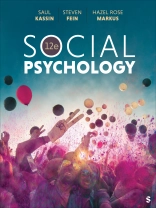Now published by Sage
The new
Twelfth Edition of
Social Psychology by Saul Kassin, Steven Fein, and Hazel Rose Markus captures the excitement of this dynamic and responsive field in our ever-changing world. The authors highlight the most exciting and important foundational and contemporary research, while every chapter also uniquely investigates the influences of culture and social class. In this enthusiastic introduction to social psychology, students delve into their own passion drivers, from favorite sports teams to social media to their own political perspectives, dispelling misconceptions and understanding the scientific foundations that explain our daily interactions and social behaviors. This textbook shows students how social psychology— its theories, research methods, and basic findings—has never been more relevant or more important.
Cuprins
Part 1: Introduction
Chapter 1 What is Social Psychology
Chapter 2 Doing Social Psychology Research
Part 2: Social Cognition
Chapter 3 The Social Self
Chapter 4 Perceiving Persons
Chapter 5 Prejudice
Part 3: Social Influence
Chapter 6 Attitudes and Persuasion
Chapter 7 Conformity
Chapter 8 Group Processes
Part 4: Social Relations
Chapter 9 Attraction and Close Relationships
Chapter 10 Helping Others
Chapter 11 Aggression
Part 5: Applying Social Psychology
Chapter 12 Justice and Law
Chapter 13 The Workplace and Business
Chapter 14 Health and Well-Being
Despre autor
Hazel Rose Markus is the Davis-Brack Professor in the Behavioral Sciences at Stanford University. She codirects Stanford SPARQ (Social Psychological Answers to Real-world Questions) and was previously the director of the Research Institute of the Stanford Center for Comparative Studies in Race and Ethnicity. She is a member of the National Academy of Sciences. Before moving to Stanford in 1994, she was a professor at the University of Michigan, where she received her Ph D. Her work focuses on how the self-system, including current conceptions of self and possible selves, lends meaning and structure to experience. Born in England and raised in San Diego, she has been persistently fascinated by how nation of origin, region of the country, gender, ethnicity, race, religion, and social class shape self and identity. With her colleague Shinobu Kitayama, she has pioneered the experimental study of how culture and self influence one another. Markus is a member of the American Academy of Arts and Sciences and the British Academy, and she is the recipient of the APA award for Distinguished Scientific Contribution and the APS William James Award for Lifetime Achievement. Some of her recent coedited and coauthored books include Culture and Emotion: Empirical Studies of Mutual Influence, Engaging Cultural Differences: The Multicultural Challenge in Liberal Democracies, Just Schools: Pursuing Equal Education in Societies of Difference, Doing Race: 21 Essays for the 21st Century, and Clash! How to Thrive in a Multicultural World.












